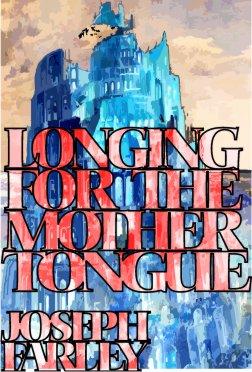Book Review
Looking for the Mother Tongue, poems by Joseph Farley, March Street Press 2010. $9Reviewed by Karla Huston
Language is one of the most unifying elements of culture. No wonder immigrants grieve so to give it up. Without the ability to speak or to understand, an individual is at a deep disadvantage, shut out of the most elemental ways of communicating. Language or lack of it speaks in other ways. In Sandra Cisneros’ novel House on Mango Street, Mamacita says, “No speak English,” because it is easier than saying, “I don’t understand.” In Ernest J. Gaines, A Lesson Before Dying, Miss Emma asks the rich plantation owner to intercede between the sheriff and her, saying, “I need you to speak for me” because she hasn’t the words or stature to speak for herself.
In this small volume of poems, Joseph Farley, long-time editor/publisher of Axe Factory Review and Cynic Press, speaks of the barriers language and culture erect, the joys and frustrations of straddling the border between two cultures, his wife’s, his own, and their son who will live in both:
my son stands in two worlds
his legs span oceans
his arms wrap the globe
Written in spare columns, Farley’s syllables and lines waste nothing in their descriptions of a man so out of place in China that even his golden hair brings the possibility of danger. Saved by his venerable mother-in-law, the narrator describes the encounter in this way:
Far from home
with no one
who spoke my tongue
I was a unique
exhibition,
a stranger with
“jintofa”
golden hair ……
Lao Wai Po
was ninety.
Her age demanded
respect.
She kept talking
until the men
lowered their pick-axes,
their fists ……
I thought I must be
very ugly
to bring on these
cold and ugly looks.…
Breaking the code of language offers metaphoric barriers as well. How does a white, Irish Catholic man from the U.S. understand the differences in child rearing, for example, as he witnesses a kid torture chickens before they are butchered to be eaten for the next meal? The parents, elders, adults—none correct or stop the child. “[M]ind your own business,” his wife says as he questions this behavior and later, he wonders if the kid has grown up, “inflicting pain on other things.”
In another poem, the narrator recalls seeing the results of the crushed insurrection at Tienanman Square, the bandaged heads, the still armed soldiers on every corner. When he asks, his wife answers that she has seen nothing. He doesn’t understand, so close to the uprising, that her language has been muted by fear. Years later, that revolutionary spirit has been replaced by consumerism and ignorance.
…
No one speaks of politics.
Money makes things seem good,
and history is a dusty book
sitting on a shelf.
Everyone knows it is there,
but no one wants
to take it down
and read it aloud.
In this slim volume of poems, Farley adeptly explores the ramifications of language and the impact of culture. He is generous with his interpretations of events even if his syntax is tightly woven. If there is criticism to be offered, it is in his sense of story, the need to embellish with explanation, to gather all the details, no matter how compactly wrought. Yet these poems honor those things he understands about being a husband and father in societies both familiar and unfamiliar to him and his responsibilities to raise his children in the best of both these worlds.
Karla Huston is the author of six chapbooks of poetry, most recently, An Inventory of Lost Things (Centennial Press, 2009). Her poems, reviews and interviews have been published widely. Her poem “Theory of Lipstick,” originally published in Verse Wisconsin #101, was awarded a Pushcart Prize.


